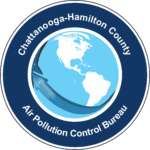FAQs
The burning of clean, untreated wood or natural vegetation for disposal without using equipment to minimize emissions.
This is a period of time where burning is not allowed. In Hamilton County, the seasonal burning ban is from May 1 to September 30.
In the 1960’s, Chattanooga was the most polluted city in the United States. The Air Pollution Control Bureau was founded to remediate and regulate this problem. We have come a long way since those days, but it is a constant challenge to maintain acceptable air quality levels as set forth by the EPA.
In 2004, after EPA tightened air quality standards, Hamilton County implemented several air quality control measures adopted as part of the Chattanooga Area Early Action Compact (EAC). One of the control measures implemented was seasonal burning because it is a proven method of controlling air quality.
By restricting burning we can decrease summertime air pollution by at least four tons per day. This control measure helps reduce overall pollution levels, helping us to maintain acceptable air quality levels in Hamilton County. We ask citizens to help keep the air clean by composting, chipping or recycling your leaves and brush. If you have any questions, please contact the Bureau at 423.643.5970.
Yes. The burning of clean, raw, untreated wood or natural vegetation is allowed in Hamilton County from October 1 through April 30 with a permit from the Air Pollution Control Bureau. The permit expires April 30 and a new permit is needed each year.
Burning is a major source of air pollution. When a person burns, the smoke leaves the property and is breathed by neighbors and others in the area.
Visit the Burning Permits page for information and instructions.
The Bureau issues two types of burning permits depending on where you live in Hamilton County.
City Permit – $60 non-refundable fee and inspection
Residents of Chattanooga, Collegedale, East Ridge, Red Bank, and Ridgeside receive a City Permit. The burn site and the material to be burned will be inspected to ensure that air pollution regulations will be followed. These cities offer free curbside pickup of leaves and yard waste.
County Permit – $10 non-refundable fee
Residents in other parts of Hamilton County receive County Permits. An inspection may be required depending on the application information and/or the location of the burn site.
Burning permits are not required for fire training purposes, warming fires, cooking fires or recreational fires (example – campfire). However, we advise you to contact your local fire department in advance.
A recreational fire only burns clean, untreated wood, and is limited to a size of 3 feet by 2 feet – anything else is considered a violation. These fires should be tended to at all times.
No. Burning in a barrel or pit is safer, but produces the same polluting smoke.
We look at the air quality forecast to see if air quality is predicted to become unhealthy, and we consult with the TN Division of Forestry to see if the conditions are safe to burn that day.
Burning permits only allow the burning of brush, vegetation and clean, raw, untreated wood.
All other items are illegal to burn in Hamilton County including:
- Tires and other rubber products
- Vinyl siding and vinyl shingles
- Plastics and other synthetic materials
- Paper products, cardboard and newspaper
- Asphalt shingles, and other asphalt roofing materials and demolition debris
- Asbestos-containing materials
- Paints, household and agricultural chemicals
- Aerosol cans and food cans
- Building material and construction debris
- Buildings and mobile homes
- Coated wire
- Household trash
